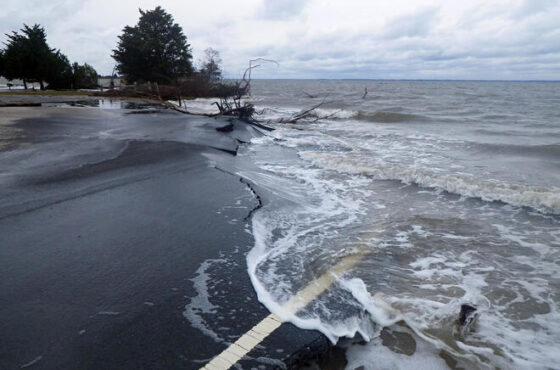Senate Approves FERC Nominees; Agency Regains Quorum
Published by the Natural Resources Defense Fund
The Senate has confirmed President Trump’s nominees to fill two of the four open seats on the Federal Energy Regulatory Commission (FERC), producing a quorum for the first time since February for the independent agency that oversees the high power electric grid, natural gas pipelines, and hydroelectric dam licensing.
Neil Chatterjee (Senate Majority Leader Mitch McConnell’s energy advisor), and Robert Powelson (commissioner on the Pennsylvania Public Utility Commission and current president of the National Association of Regulatory Utility Commissioners) now join Acting Chair Cheryl LaFleur on the five-member commission.
Today’s vote comes almost two months after the Senate Energy and Natural Resources Committee voted to advance the Chatterjee and Powelson nominations to the Senate floor. The Senate delayed a vote on them in part because of other pending FERC nominations from Trump. The logjam broke when Trump finally submitted his nominations for the two remaining open slots to the Senate: Kevin McIntyre, an energy attorney at the large international law firm Jones Day, and Richard Glick, the Democratic General Counsel for the Senate Energy and Natural Resources Committee. (Trump nominated a Democrat because no more than three of FERC’s five commissioners can be Republicans, and Chatterjee, Powelson, and McIntyre are all Republicans.)
Glick and McIntyre are now scheduled for a confirmation hearing before that committee on September 7, but there is no indication when the full Senate might vote on their confirmation.
Having achieved a quorum for the first time in six months, FERC can now tackle a number of significant policy challenges in earnest. They include continuing to facilitate the integration of growing levels of cost-effective clean energy into the grid, and reforming FERC’s natural gas pipeline approval process. Progress on these and other critical areas are vital to serving the commission’s statutory public interest obligations.

Our simple message to the commission: Remain independent, keep up with the fast-changing electric grid, and avoid creating barriers through inaction or new limitations. FERC has a bipartisan tradition of removing electricity market and planning barriers to new energy resources. With wind and solar regularly hitting new output peaks, and energy storage coming on strong, FERC-regulated energy markets and planning must continue to evolve to reflect the new reality of a more efficient, cleaner, and affordable grid.
Pending Challenges
FERC has a full plate of energy challenges. Among them:
State clean energy choices
One of the hottest issues in the world of electricity this year is accounting for state clean energy policies in FERC-regulated electricity markets. FERC held a two-day public meeting in early May on the topic, which is going to be a growing focus for FERC and the regional grid markets around the country for the remainder of this year and well into the future. Well-designed FERC markets can co-exist with, rather than undermine, state energy policies. FERC should respect states’ sovereignty to set energy and environmental policy, not frustrate it.
Baseload power myth
Another hot issue—the Department of Energy’s hurried review of “baseload power” and the effects of clean energy on grid reliability. As we and many others have said, wind and solar power contribute to a dependable power supply, help to prevent blackouts and other grid disturbances, and create a more flexible and diverse generation fleet. It would be “ludicrous” to suggest that renewable energy undermines grid stability, just as it would be wrong to suggest that “baseload” power is inherently necessary for reliable grid operation. (Baseload has traditionally been used to refer to large coal and natural gas power plants that cannot be easily ramped up and down to adjust for variable renewable energy output, but it is an outdated concept for today’s electricity grid.) FERC could play a critical role in the Department of Energy’s ongoing activities in this area by separating fact from political agenda.
Rooftop solar, electric vehicles, storage
Another critical topic: last fall FERC proposed an important new standard to remove barriers to market entry for the electricity generated from rooftop solar panels, electric vehicles plugged into the grid, and other customer-owned energy storage and locally generated “distributed energy resources” (DERs). Critically, FERC’s proposal includes allowing storage and other DERs to combine for the purposes of participating in power markets—in other words, aggregating or pooling resources for administrative and operational efficiency. It’s a smart, commonsense reform. Now that FERC has regained its quorum, it should move forward and issue the final rule– including the aggregation provisions– to prevent ongoing discrimination against customer-owned resources in FERC-regulated electricity markets.
Clean energy transmission
Infrastructure also is a hot topic in Washington, and here FERC also has an important role to play. While America has some of the world’s best renewable energy resources, there is a need for environmentally protective transmission infrastructure to connect the top wind resources, located predominantly in remote areas, to distant cities and communities with a demand for low-cost clean energy. A major barrier is the lack of a single planning framework among regional grid planning regions for these projects. For example, much of the country’s highest-value wind energy resources are in the Southwest Power Pool regional power system, but current grid planning rules limit the amount of transmission available to tap into that clean, affordable power.
 Southwest Power Pool footprint overlaid on wind power resource (darker blue is higher value)
Southwest Power Pool footprint overlaid on wind power resource (darker blue is higher value) With relatively minor changes to planning rules, FERC can spur new clean energy-focused transmission projects. As an added benefit, these projects will reduce the need for new natural gas plants (which emit carbon pollution) and pipeline development, as well as the health and other problems associated with natural gas extraction.
Gas pipeline approvals
Speaking of natural gas, FERC continues to face criticisms for its approvals of new interstate natural gas pipelines and liquefied natural gas terminals. FERC can and should take significant additional steps to improve gas market efficiencies and maximize the use of existing pipelines over new pipes.
We encourage new Commissioners Chatterjee and Powelson to keep FERC’s responsibility to protect the public interest uppermost in their minds. This, plus a healthy bipartisan approach, will provide reason for optimism about the commission’s future.
This blog provides general information, not legal advice. If you need legal help, please consult a lawyer in your state.
Read the full article at: https://www.nrdc.org/experts/john-moore/senate-approves-ferc-nominees-agency-regains-quorum





